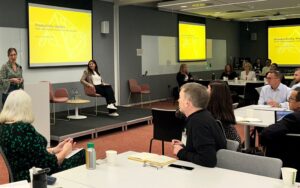Last week’s SCDI Productivity Matters Conference 2023 was held in the stunning surroundings of the University of Glasgow’s Advanced Research Centre (ARC) and the surroundings very much highlighted how times have changed. A very open and transparent building, the ARC promotes collaboration and public engagement, and is a far cry from my years in a windowless, basement research lab at the University of Strathclyde which wasn’t much changed from labs used in the 19th C.
Here are some of the highlights from the day.
A new definition is needed
It’s long been reported that productivity in the UK is stagnating and we’re being left behind by our competitors, though Prof John Tsoukalas (University of Glasgow) did comment that other advanced nations are also experiencing productivity challenges. During the first Q&A session, the day’s key takeaway, in my opinion, came from the floor. The standard definition of productivity (very simplistically, output divided by input) doesn’t really hold for knowledge workers and the proxy of measuring hours worked is not appropriate any more. During her very lively presentation on the future workplace, Nicola Millard (BT) asked how we measure productivity in a digital age. There wasn’t a new definition proposed, but it’s a question that I’m sure will provoke earnest discussions within SCDI.
Challenging Stubborness
One of the great case studies was by Consultant Anaesthetist Dr Matthew Freer (Infix Support) on a new cloud-based solution to tackle waiting lists in the NHS. He explained that the current system is so cumbersome and inefficient that it is leading to a massive reduction in the number of possible surgeries being carried out. The new software solution has been shown to massively increase the number of surgeries possible per day, saving millions, but he explained that there was still some reluctance within the NHS to embrace the opportunity – “public sector stubbornness”. Where they were able to make inroads was by understanding who they were pitching to, finding out “what keeps them up at night” (“meeting published targets”) and tailoring their pitch accordingly. Infix Support have ambitious plans to increase their reach within NHS Scotland and beyond.
P is for…
Lindsay Keegans (Ooni Pizza Ovens) described how the company have gone from a “Heath-Robinson” oven prototype to £200m turnover in a decade. Lindsay’s talk was on the subject of “profit with a purpose” and highlighted how the values within the organisation that have allowed them to achieve B Corp status in 2023 are embedded in their DNA but that it takes collective effort to constantly live up to these values. Hiring people who share the values has been key to growth and has allowed Ooni to achieve an Employee NPS (Net Promoter Score, a proxy for employee happiness) of 61%, when the UK average is just 16%. After all the good news, Lindsay then lost the room when she confessed to liking pineapple on her pizza. There’s nowt so queer as folk!
Though decisions for charities
Katie McVey (Enable Scotland) was a last-minute replacement for her colleague, stating that the charity sector was not reaching its full potential in terms of GDP. The sector needed to challenge itself more – the example given was of thousands of charities spending money on back-office functions, leading to massive duplication of resources. She questioned whether charity leaders were able to make the tough calls and wondered if increasing productivity was incompatible with the mission of charities.
Finding your feet
It was humbling to hear from Cor Hutton MBE on what she has been through and achieved in the last decade, from being a double-double amputee and setting up the charity (Finding Your Feet), from climbing Kilimanjaro to being angry that she’ll never be able to wear flip flops again. A truly inspiring speech from an inspirational human being. If we all had a fraction of Cor’s attitude then maybe the reported productivity and engagement concerns wouldn’t be anywhere near where they currently are.
An interesting day with the Productivity Club Scotland (some familiar faces and themes from 2020). A few questions that need addressed, but case studies and presentations highlighted where great progress has been made.
If you want to know more about the SCDI Productivity Clubs please visit https://www.scdi.org.uk/productivity-clubs/.




